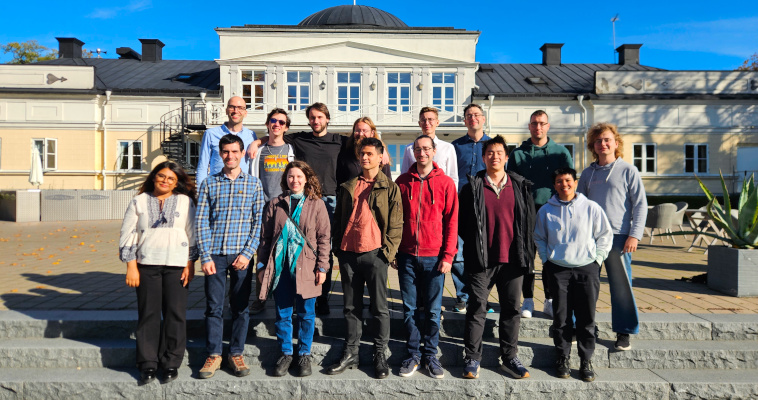
Missing: Arash Haratian, Daniel Gnad, Paul Höft, Ulf Nilsson.
Welcome to the website of the Machine Reasoning Lab at Linköping University, Sweden! We develop algorithms for intelligent sequential decision-making using automated planning and machine learning.
News
- 2026-01-21: Arman Mohammadi joins the lab.
- 2026-01-07: Jordan Thayer joins the lab.
- 2026-01-01: Jennifer Santos joins the lab.
- 2025-12-15: Mariam Musavi joins the lab.
- 2025-12-03: Jendrik Seipp becomes a Wallenberg Academy Fellow.
- 2025-11-08: We have two accepted papers at AAAI 2026.
- 2025-10-14: Jendrik Seipp receives the ICAPS 2025 Influential Paper Award for the paper Counterexample-guided Cartesian Abstraction Refinement.
- 2025-10-06: We published a paper in JAIR.
- 2025-09-18: We have an accepted paper at NeurIPS 2025.
- 2025-09-01: Dillon Chen visits our group for two months.
- 2025-07-22: Our system demonstration Graphical Navigation in Solution Spaces using PlanPilot got accepted at ICAPS 2025.
- 2025-07-11: We have two accepted papers at ECAI 2025 and two at KR 2025.
- 2025-07-04: We have an accepted paper at JELIA 2025.
- 2025-06-17: Jendrik Seipp receives a Future Research Leaders grant from the Swedish Foundation for Strategic Research.
- 2025-06-02: Augusto B. Corrêa visits our lab for two weeks.
- 2025-04-30: Our group won the Explainability track of the Beluga Challenge.
- 2025-03-26: Jendrik Seipp receives a Distinguished Teacher Award for the "Automated Planning" course.
- 2025-03-26: Our WASP PhD project Model-Based Attention for Scalable AI Planning has been accepted.
- 2025-03-24: Dominik Drexler defends his PhD thesis.
- 2025-03-13: We published a paper in JAIR.
- 2025-03-01: We have an accepted paper at ICAPS 2025.
- 2025-03-01: Windy Phung joins the lab.
- 2025-01-15: Arnaud Lequen joins the lab.
- 2024-12-19: Dominik Drexler receives the Lawson Prize 2024 for his excellent performance during his PhD studies.
- 2024-12-15: Mauricio Salerno visits our group.
- 2024-12-10: Our group has two accepted papers at AAAI 2025.
- 2024-11-18: Oliver Joergensen joins the lab.
- 2024-10-31: Jendrik Seipp receives a Starting Grant from the Swedish Research Council.
- 2024-10-23: Jendrik Seipp gives an invited talk at ECAI 2024 as part of the Frontiers in AI series.
- 2024-10-02: Daniel Gnad receives a Zenith research grant from Faculty of Science and Engineering at Linköping University.
- 2024-09-13: Arash Haratian joins the lab.
- 2024-09-01: Martín Pozo from Madrid visits our group for three months.
- 2024-07-25: We have two accepted papers at KR 2024.
- 2024-07-03: We have one accepted paper at ECAI 2024.
- 2024-04-30: David Speck and Daniel Gnad receive the ICAPS 2024 Best Paper Award for their paper Decoupled Search for the Masses: A Novel Task Transformation for Classical Planning.
- 2024-04-01: Michaela Urbanovská visits our group for two months.
- 2024-03-21: David Speck receives the ICAPS Best Dissertation Award for his thesis Symbolic Search for Optimal Planning with Expressive Extensions.
- 2024-02-12: Our group has five accepted papers at ICAPS 2024.
- 2024-01-22: Elliot Gestrin joins the group.
- 2024-01-01: Our group becomes its own fiscal entity within LiU and is renamed to "Machine Reasoning Lab".
- 2023-10-30: Together with our collaborators, we have won multiple awards (4x first place, 2x second place) in the Second CoRe Challenge.
- 2023-10-24: Our WASP Cyber Security NEST application AI for Attack Identification, Response and Recovery (AIR²) has been accepted.
- 2023-10-16: Damien Van Meerbeeck joins the group.
- 2023-09-01: Kristina Levina joins the group.
- 2023-07-15: We have four accepted papers at ECAI 2023.
- 2023-07-12: Together with Alvaro Torralba, Daniel Gnad won the Learning Track of the International Planning Competition 2023.
- 2023-07-11: Together with our collaborators, we have won all three classical tracks of the International Planning Competition 2023.
- 2023-06-19: Farid Musayev joins the group.
- 2023-05-25: Our WASP Industrial PhD project Neuro-Symbolic AI for Improving Energy Efficiency in 6G has been accepted.
- 2023-05-19: Our group has three accepted papers at KR 2023.
- 2023-04-01: Our project Symbolic Search for Diverse Plans and Maximum Utility for the AIPlan4EU project open call for innovators has been accepted.
- 2023-03-30: Our WASP PhD project Collaborative Constraint-Based Planning has been accepted.
- 2023-03-01: Mauricio Salerno is visiting our group for three months.
- 2023-02-06: Our group has four accepted papers at ICAPS 2023.
- 2022-11-18: Our group has one accepted paper at AAAI 2023.
- 2022-10-19: David Speck receives the Wolfgang-Gentner-Award for Young Researchers for outstanding scientific achievements in his dissertation awarded by the University of Freiburg.
- 2022-10-17: Martin Funkquist joins the group.
- 2022-10-13: Jendrik Seipp receives a Zenith project grant from the Faculty of Science and Engineering at Linköping University.
- 2022-10-01: Markus Fritzsche and Mika Skjelnes join the group.
- 2022-06-01: David Speck joins the group.
- 2022-05-05: Our paper Learning General Optimal Policies with Graph Neural Networks: Expressive Power, Transparency, and Limits receives the ICAPS 2022 Best Paper Award.
- 2022-05-03: Daniel Gnad receives the ICAPS Best Dissertation Award for his thesis Star-Topology Decoupled State-Space Search in AI Planning and Model Checking.
- 2022-03-01: Our group has five accepted papers at ICAPS 2022.
- 2022-02-01: Daniel Gnad joins the group.
- 2021-08-25: Our paper Learning Generalized Unsolvability Heuristics for Classical Planning receives an IJCAI 2021 Distinguished Paper Award.